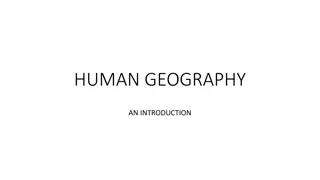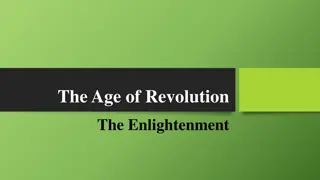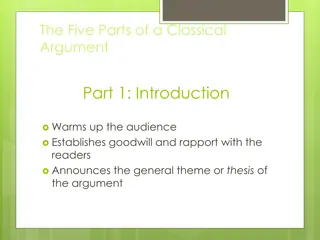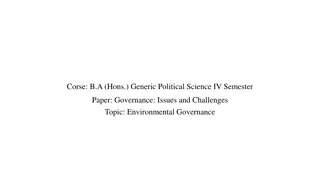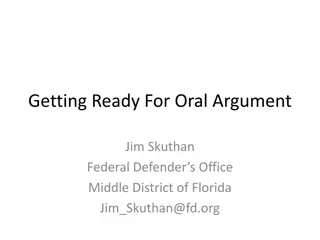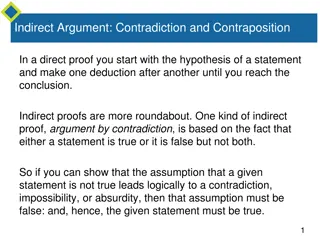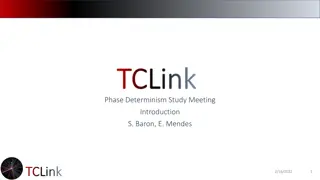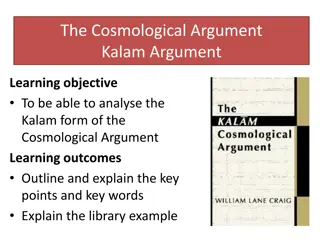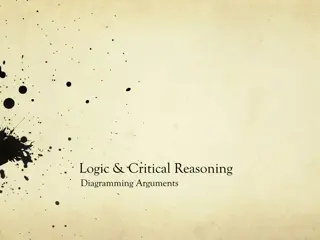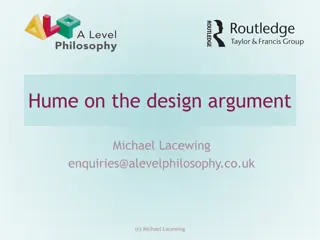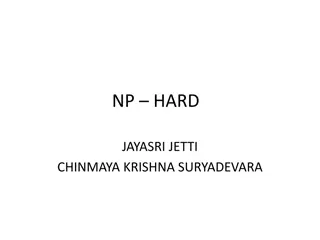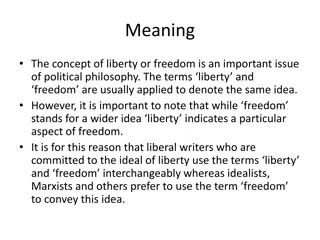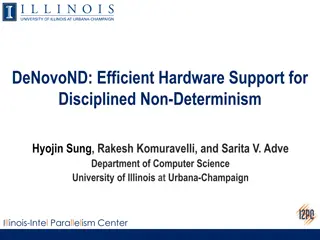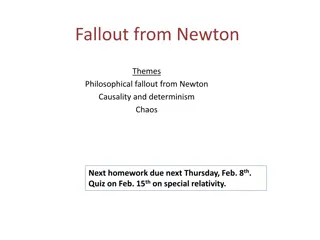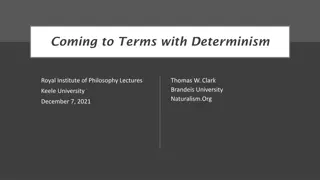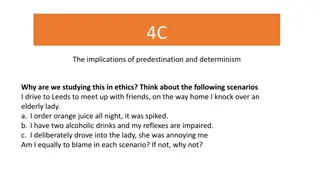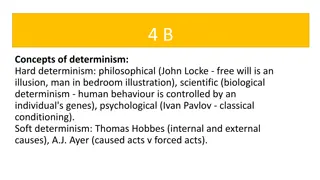Exploring the Interplay of Freedom and Determinism: Hobbes's Regress Argument
Delve into the philosophical debate between freedom and determinism through the lens of Hobbes's Regress Argument, examining the challenges posed by the relationship between freedom of action and freedom of will in the context of human decision-making.
Download Presentation

Please find below an Image/Link to download the presentation.
The content on the website is provided AS IS for your information and personal use only. It may not be sold, licensed, or shared on other websites without obtaining consent from the author. Download presentation by click this link. If you encounter any issues during the download, it is possible that the publisher has removed the file from their server.
E N D
Presentation Transcript
Ideas of Freedom Freedom and Determinism Guy Longworth g.longworth@mac.com
Agenda I. Sketch a puzzle that arises from interplay of freedom and determinism. II. Introduce an early modern discussion of aspects of the puzzle, between Thomas Hobbes and John Bramhall. III. Fill in some details about elements of puzzle, and some related puzzles. IV. Consider some prominent responses to the puzzle.
Hobbess regress Why does Hobbes think that freedom of the will makes no sense? One reason is that he thinks humans lack special powers, so his metaphysics makes no space for a power of free decision. But he also has what he takes to be a powerful argument against the scholastic picture, his regress argument.
Hobbes regress Hobbes s regress argument takes off from the scholastics reason for holding that freedom of action depends on freedom of will. They held that freedom of action depends on freedom of will, because they held that, in order to be free, action must be in our power: we must have had the power either to perform or not to perform the action.
Hobbes regress The scholastics therefore need to explain two components of their position: 1. Why freedom of action is impossible except as derived from freedom of decision or will. 2. How freedom of decision or will is possible.
Hobbes regress Hobbes s regress argument seeks to connect these two issues for the scholastic position in order to generate what he takes to be an insurmountable objection. He argues as follows. If freedom of action depends on prior freedom of will, that must be because freedom per se depends on prior freedom. Otherwise, why couldn t action be free in the absence of freedom of will?
Hobbes regress But now, if freedom in general depends on prior freedom, not only freedom of action, but also freedom of decision must depend on prior freedom. But if freedom of decision depends on prior freedom, it presumably depends on prior freedom of decision: the power to decide to decide.
Hobbes regress 1. We can t in general decide to decide, at least not in the way that we can apparently decide to act. We can decide to do something that will bring about a decision tomorrow for example, we can decide to try to acquire new information, or take a decision pill. But we can t simply decide to decide (e.g.) to raise our hands.
Hobbes regress For example, suppose that you were to offer me one million pounds to decide to decide to raise my hand, without thereby (yet) deciding to raise my hand. In order to win the money, I would have to be rational in having decided to decide to raise my hand, while having no motivation to raise my hand.
Hobbes regress But how could I be rationally motivated to decide to raise my hand, without at the same time being motivated to raise my hand? Since I couldn t be, I couldn t rationally decide to decide without thereby deciding.
Hobbes regress 2. If an action or decision is free only if it depends on free action or decision, then we face a regress. For my action to be free, the decision that led to the action would have to be free. For the decision to be free, it would have to be preceded by a further free decision. And for that decision to be free, it too would have to be preceded by a free decision. And so forth.
Hobbes regress Thus, Hobbes: I acknowledge this liberty, that I can do if I will, but to say, I can will if I will, I take to be an absurd speech. ( Of Liberty and Necessity )
Hobbes regress P1. Any free action must be subject to free will. P2. Any condition on free action is a condition on free agency in general. C3. Any free agency that is, free action or free will must be subject to free will. (From P1, P2.) But, P4. No decision that is, no agency of the will can be subject to free will. C5. No decision no agency of the will can constitute free agency. (From C3, P4.)
Hobbes regress The key premise of this argument is: P2. Any condition on free action is a condition on free agency in general. In order to avoid it, the defender of freedom of will needs to explain the two things mentioned earlier, in a way that avoids the argument.
Hobbes regress 1. Why freedom of action is impossible except as derived from freedom of decision or will. We can now see that the defender of a scholastic position will have to address this issue without deriving it directly from a more general requirement on free agency.
Hobbes regress 2. How freedom of decision or will is possible. We can now see that the defender of a scholastic position will need to address this issue without appealing to a further free act of will that is, a further free decision. So, the explanation of what makes an action free must differ from the explanation of what makes a decision free.
Responses to Hobbes We have two broad options then: Option 1: Try to find a way of answering Hobbes s regress argument, by addressing the two issues that it raises for the scholastic position. Option 2. Accept Hobbes s argument, and give up core aspects of the scholastic position.
Responses to Hobbes Historically, option 2 has probably been the most popular option. Many people have been convinced by Hobbes s regress argument, or arguments like it, that we can t make sense of libertarian freedom of will.
Responses to Hobbes However, at the same time, it is intuitively up to us how we decide to act. And it s not entirely clear that the sense in which this is up to us is captured by the simple Hobbesian model, on which this is just a matter of the comparative strength of our desires. And that is precisely the issue that Bramhall presses in response to Hobbes.
Responses to Hobbes He [Hobbes] talks much of the motives to do and the motives to forbear, how they work upon and determine a man , as if a reasonable man were no more than a tennis-ball, to be tossed to and fro by the rackets of the second causes [desires]; as if the will had no power to move itself, but were merely passive, like an artificial popinjay removed hither and thither by the bolts of the archer who shoots on this side and that. (Bramhall A Defence of True Liberty )
Take home questions Q1. Can we decide to decide? Q2. Is Hobbes right to hold that an action is free if it derives from a desire? Q3. Is Hobbes right to hold that a person is free if they are able to act on their desires? Q4. How should the defender of the scholastic position response to the two issues (explain why free action depends on decision; explain how decision can be free)?





